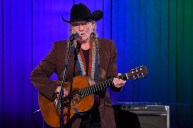The avant-garde composer Gene Tyranny once referred to it as "the famous gay cowboy song." And he's not wrong. "Cowboys Are Frequently, Secretly Fond of Each Other" is perhaps the most well-known example of an outwardly queer country song. But this is no love ballad between two men. The unusual track makes a larger, cheekier commentary on Western machismo through lyrics that are essentially straightforward, backed by a minimal country melody.
Videos by Wide Open Country
Since the song's release by Ned Sublette in 1981, "Cowboys Are Frequently, Secretly Fond of Each Other" has perplexed and delighted listeners... including Willie Nelson who enjoyed playing the tune on his tour bus for decades. In 2006, Nelson finally released his own cover -- on the lucrative heels of Brokeback Mountain fever. That popular version is generally considered the first mainstream LGBT-themed country song.
Ned Sublette
The songwriter and musicologist Ned Sublette was born in Lubbock, Texas, and raised in Eastern New Mexico. That upbringing has informed Sublette's unique sound, which famously fuses a country-western twang with an Afro-Caribbean style. His popular 1999 album Cowboy Rumba was inspired by a life-changing trip to Cuba. Prior to that experience, though, Sublette was living in New York City. It was there, in the stylish city streets, that Sublette found inspiration for a new kind of country ditty: one which satirized the Urban Cowboy-craze thatt was sweeping the nation.
Sublette described that process, in detail, to The Midland Reporter-Telegram in 2016:
"I was back visiting Portales in 1981. I had decided to start my own band and was working up a repertoire. It was the height of the urban cowboy thing and all the songs on country radio, which I listened to a lot in those days, were about cowboys. "My Heroes Have Always Been Cowboys," "Mamas Don't Let Your Babies Grow Up To Be Cowboys," etc. I loved those songs and have been a big Willie Nelson fan since a long time before "Red Headed Stranger." Meanwhile, this was 1981, and no one had never heard of AIDS. It was a very different world. The image of the cowboy has, for obvious reasons, long been a part of the gay sensibility and in Manhattan, where I lived, there was a bar on Christopher Street, at the time the epicenter of New York gay, called Boots & Saddles, which I used to walk past a lot. I sat down at the piano and started playing that good old West Texas waltz feel and put those things together, feeling like a traveler between worlds. It practically wrote itself, very quickly. Being back in the small town I grew up in, I was in a reflective mood about what it's like -- not to be gay in a small town necessarily, but just to be different in any way. You know, big cities are full of people who left small towns because they felt somehow stifled or disapproved of, and often those are highly creative people. Apparently I touched a nerve."
Sublette penned the now-famously frank lyrics intending to satirize the moment: "Say, what do you think all them saddles and boots was about?" The subject matter is serious: the rural condemnation of gay lifestyles. But Sublette approaches the matter with a tone that's obviously tongue-in-cheek. As he explained it to MRT, "It's a song for people with a sense of humor, written by a composer with a sense of humor."
Listen to Sublette's original song, above, and you'll understand why the track became something of a cult classic. The slow tempo allows time for each line to build, with each verse offering a new, ironic punchline in the grand dance of gay desire (and repression). Among those early fans? The country music legend Willie Nelson. Nelson was introduced to the song by Saturday Night Live bassist Tony Garnier in 1988 and enjoyed playing it often: "I thought it was the funniest goddamn song I'd ever heard. I had it on the bus for 20 years, and people would come in and I'd play it," he told Time Magazine. However, Nelson's own cover remained unreleased until 2006.
Willie Nelson's Version
Willie Nelson first distributed his rendition of "Cowboys Are Frequently, Secretly Fond of Each Other" via iTunes on Valentine's Day in 2006. Despite having the demo sitting in a drawer for years, Nelson said the timely acclaim for Brokeback Mountain inspired the sudden release. The film, which focused on the drawn-out romance between two American cowboys, was a critical sensation and a box-office hit. In addition to winning three Oscars, the movie fascinated the nation and marked a milestone for LGBT-centered cinema. Everyone was talking about Brokeback Mountain.
Nelson was a part of that project, too, contributing the song "He Was a Friend of Mine" to the soundtrack. But it was his subsequent release of "Cowboys Are Frequently, Secretly Fond of Each Other" which would forever link Nelson to the queer cowboy zeitgeist. Compared to Sublette's original, Nelson's version cuts out the campy accompaniment in lieu of a more traditional acoustic approach. In lessening the experimental quality of the sound, Nelson's song is a rare commodity: a squarely country anthem for the gay experience. It's widely recognized as the first song, by any mainstream country musician, to fall into that category.
Clearly, Nelson knew the time was right to publish "Cowboys Are Frequently, Secretly Fond of Each Other." (The song was Nelson's highest-charting since his 1984 duet with Julio Iglesias and hit No. 52 on the Billboard Hot 100: a spot which Nelson had not occupied since the 2002 Toby Keith duet, "Beer for My Horses.") But there was more to that decision than simply the commercial aspect. At the time, Nelson's longtime manager and friend David Anderson had recently come out as gay. And as Nelson so punnily put it: "The song's been in the closet for 20 years. The timing's right for it to come out. I'm just opening the door."
In 2009, the track was re-released on Nelson's full album Lost Highway, which was produced by Lost Highway Records. However, its inclusion incited fresh controversy. Immediately following "Cowboys Are Frequently, Secretly Fond of Each Other" on the compilation was a new song titled "Ain't Goin' Down on Brokeback Mountain" which featured the offensive refrain: "That sh*t ain't right (that sh*t ain't right)." The extent to which that lines were meant seriously remains unclear. (The song is itself borrowed from the country comedy group Saddle Sores.) After all, Nelson maintains outspoken support for the LGBTQ community. Still, many fans felt its inclusion undercut the progressive spirit of the previous track.
Regardless, "Cowboys Are Frequently, Secretly Fond of Each Other" has since taken on a life of its own. Now reclaimed by musicians who are actually gay, covers by Pansy Division and Orville Peck are two noteworthy examples. Watch Peck's performance on SiriusXM below.
"Cowboys Are Frequently..."
Well, there's many a strange impulse out on the plains of West Texas
There's many a young boy who feels things he can't comprehend
And a small town don't like it when somebody falls between sexes
No, a small town don't like it when a cowboy has feelings for men
And I believe to my soul that inside every man, there's the feminine
And inside every lady, there's a deep manly voice loud and clear
Well, a cowboy may brag about things that he's done with his women
But the ones who brag loudest are the ones that are most likely queer
Cowboys are frequently secretly fond of each other
Say, what do you think all them saddles and boots was about?
And there's many a cowboy who don't understand the way that he feels for his brother
And inside every cowboy, there's a lady that'd love to slip out
And there's always somebody who says what the others just whisper
And mostly that someone's the first one to get shot down dead
So when you talk to a cowboy, don't treat him like he was a sister
You can't fuck with a lady that's sleepin' in each cowboy's head
Cowboys are frequently secretly fond of each other
What do you think all them saddles and boots was about?
And there's many a cowboy who don't understand the way that he feels for his brother
And inside every lady, there's a cowboy that wants to come out
And inside every cowboy, there's a lady that'd love to slip out




